
The Hollow Echo of the Badge: Jesse Lee Soffer, Jay Halstead, and the Lingering Questions of Chicago P.D.
The flickering blue and red of the Chicago P.D. squad car, reflected in rain-slicked streets, have become a symbol of the city's relentless battle against crime. For years, Jay Halstead, played with a quiet intensity by Jesse Lee Soffer, stood at the heart of that battle, a beacon of unwavering dedication and a cornerstone of the show’s appeal. But the badge, once a symbol of his commitment, now seems to weigh heavily on Soffer's future, and in a recent interview, he illuminated the one thing holding him back from a potential return: the fundamental changes to the show that have eroded the core values he believed Halstead represented.
For those who followed Halstead's journey, his departure felt like a seismic shift. He wasn’t merely transferred or killed off; he chose to leave, accepting a position with the Army to fight cartels in Bolivia. It was a decision fueled by a growing unease with the increasingly blurred lines of justice within the Intelligence Unit. Halstead, once the moral compass, found himself adrift in a sea of compromised ethics, and the show, arguably, had followed suit. Soffer's hesitation to return hinges on this very evolution, a concern shared by many long-time viewers who feel the show has strayed from its original promise.
The early seasons of Chicago P.D. were defined by the tension between adhering to the law and pushing the boundaries in pursuit of justice. Halstead and his partner, Erin Lindsay (Sophia Bush), embodied this struggle, wrestling with their own demons while navigating the morally ambiguous world of policing. They made mistakes, faced consequences, and ultimately, strived to uphold a semblance of integrity. This internal conflict, this constant questioning of their actions, was what made them relatable and compelling.
However, in more recent seasons, the show seems to have leaned heavily into the latter aspect – pushing boundaries – often at the expense of ethical considerations. The relentless pursuit of justice has, at times, morphed into a justification for bending, if not outright breaking, the rules. While procedural dramas often explore the complexities of morality in law enforcement, Chicago P.D. risks losing its way by consistently showcasing methods that prioritize results over ethical considerations. It is this shift, this departure from the nuanced exploration of morality, that likely weighs on Soffer’s decision.
He understands, perhaps better than anyone, that Halstead's return would necessitate a believable narrative arc. Simply re-inserting him into the current landscape without addressing the ethical compromises he fled from would ring false. It would be a disservice to the character he helped build and a betrayal of the values he represented. For Soffer, a return to Chicago P.D. isn't just about showing up on set; it’s about ensuring the integrity of Halstead and the narrative integrity of the show itself.
Therefore, the "one thing" stopping Soffer from returning isn't a lack of desire, nor is it animosity towards the cast and crew. It’s the profound transformation of the show’s ethos. For Halstead to return and be believable, the show would need to grapple with the ethical gray areas it has increasingly embraced. It would need to revisit the internal conflicts that once defined its characters and re-establish a balance between the pursuit of justice and the upholding of the law.
The future of Chicago P.D. remains uncertain, but Soffer's hesitation serves as a potent reminder. It’s a reminder that the strength of a procedural drama lies not just in the adrenaline-fueled action sequences, but in the complex characters who grapple with moral dilemmas. It's a reminder that the badge, while a symbol of authority, should also represent a commitment to integrity and justice. And perhaps, most importantly, it's a reminder that sometimes, the most powerful statement a performer can make is to stand by the values they helped create, even if it means walking away from the familiar flashing lights of Chicago P.D. and the hollow echo of a badge no longer ringing true.
